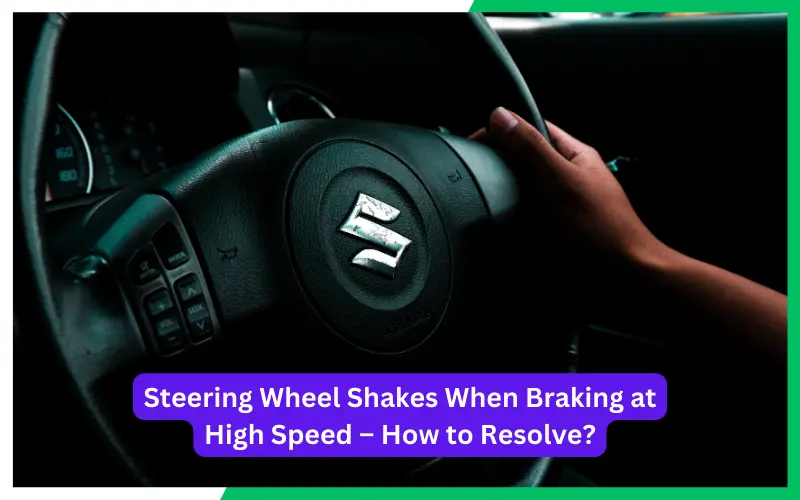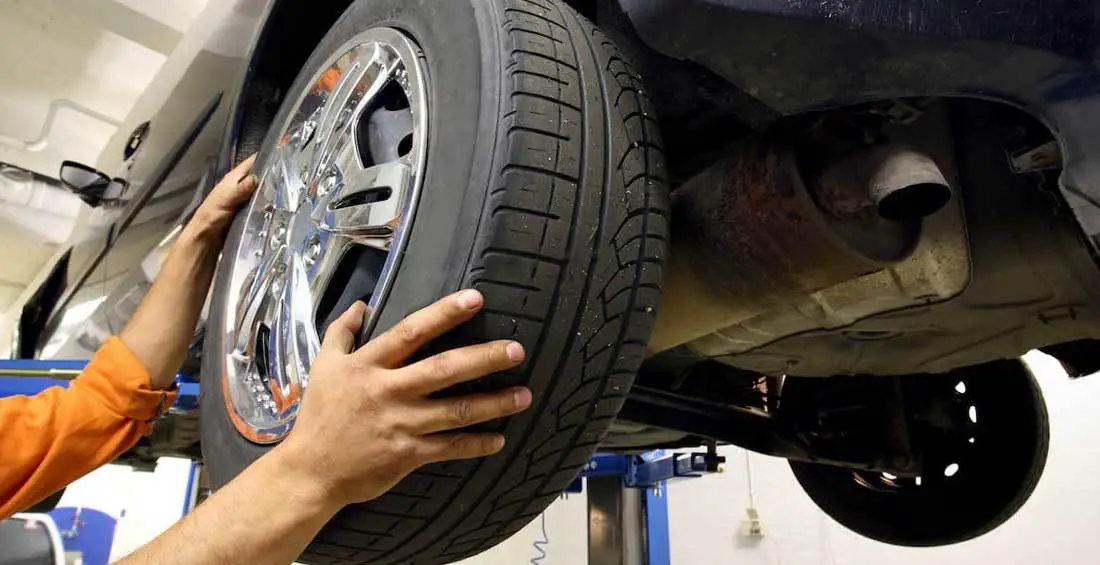Steering Wheel Shakes When Braking at High Speed – How to Resolve?
Let’s assume you are driving at high speed like you often do. Suddenly, you pump on the brake pedal and feel a strong quiver in your hands.
Right, it’s coming from the steering wheel you are holding on. And what strikes your mind now is that it has been happening for a while. Your steering wheel shakes when braking at high speed!
Obviously, it’s not usual, and you are wondering what’s actually wrong. Should you be worried? Mm, maybe yeah. Something of your brake system might be out of order. You should perform necessary inspections now and troubleshoot on whatever is going haywire.
Read along to learn about the possible reasons for such a problem and the things you can do to solve the issue.

What Could Be the Reasons?
Now, there are a number of reasons for which you can face this issue. You can either head to a professional or just find it out yourself. The most common three reasons are worn brake pad, dry guide pins, and warped rotor. Let’s know what can be wrong with these.
1. Worn Brake Pads
The brake pad is an important part of the mechanism of a brake system. When the brake pedal is pumped, the caliper applies some pressure on the pads. The pads then firmly squeeze on the rotor, and consequently, the wheel ceases its motion. This ultimately brings the car to a stop.
If something is wrong with the brake pads, it may cause a vibration to the steering wheel. This mostly happens when the pads are so old and worn out. They fail to apply a strong grip on the rotor, which causes your steering wheel to shake.
Calipers are made to last for a long while. However, rotors and brake pads do become dull over time. The good news is they both can be replaced easily.
2. Dry Guide Pins
The shaking of your steering wheel while dry guide pins can also cause braking. And the function of the guide pins is to guide the brake pad to the rotor. To be effectively functioning, they need to be clean and lubricated enough.
So, when they become dry, they may lead the brake pad towards the rotor at a wrong angle. Hence, you feel the shake.
3.Warped Rotor
As mentioned before, a rotor’s job is to create friction with the brake pads to make the wheel stop. Now, because of the high-friction, it becomes extremely hot. And over time, the heat causes the rotor to get worn or warped.
So, when that happens, your brake pad hits onto rather an unsmooth surface, and you feel the shake on your steering.
You can check the rotor by spinning it with hand and looking for any irregularities. Or, you can remove the rotor and measure its thickness with a micrometer. If the thickness doesn’t match up to the minimum specifications, it is worn and needs to be replaced.

How to Resolve It?
You should replace the rotor and brake pads, and lubricate the guide pins with grease. Or, if your brake pads are still good, you can only change the rotor and grease the guide pins. With a few basic tools, you can do the job of changing and cleaning them. Let’s learn how to perform the troubleshooting –
Step 1
First of all, you need to collapse the caliper. But before that, don’t forget to open the hood and remove the lid from the master cylinder reservoir. Because not doing that may risk the lid to be spilled when you collapse the caliper.
Now remove the tire and put a ply bar between the brake pad and rotor. The constant pressure should press the pistons into the caliper. However, be careful not to damage them.
Step 2
Now, take off the lower and upper mounting bolts from the caliper. Make sure you adjust the caliper so it won’t dangle by the brake line.
Step 3
Then proceed to remove the caliper bracket. The bracket should have even larger bolts than those from the caliper. These bolts are glued in place with thread locker. So, you can use an impact gun to remove the bolts; otherwise, you will need to torch them. Also, you can spray some penetrating oil on the rotor to free it up.
Step 4
Now is a good time to remove the rotor. Most of the time, rotors are adjusted to a hub with a bolt, remove it if you see one. The rotor should be easy to be taken off now. Take it off and clean the hub.
Step 5
You are now all set to install a new rotor. Just do the reverse of what you have done to remove it, it’s that easy! Be sure to clean off the old thread locker when you reattach the bolts and apply a new thread locker. Then reinstall the caliper bracket according to the specifications of the manufacturer manual.
Step 6
After setting up the rotor, now install the brake pads. Be sure to adjust the right pad to the right side. The one with a low pad indicator shall be adjusted to the piston side of the caliper.
Step 7
Now, you can grease the guide pins. Remove the pins, clean them, apply some grease, and put them back! As simple as that.
Step 8
Then proceed to replace the caliper. But again, before working with the caliper, wrap the master cylinder with some tissue paper, so that the spilled fluid gets caught. Clean the caliper, as well. Use a c-clamp, put the pistons back into the caliper, and then tighten the bolts.
Step 9
Fill the master brake reservoir to the fullest and cap it. Add the tire back on to the wheel, and you’re done!
Step 10
But wait! It’s not over yet! Now you have to pump the brake several times before they feel firm enough. This is an important thing to do, and don’t forget this. Otherwise, the brake won’t work when you use it again later.
Done? Well, now you are actually done. Hope the problem is fixed now.
Is It Safe to Drive if my Steering Wheel Shakes When Braking?
If your steering wheel shakes when braking, it is not safe to drive your vehicle. The shaking may indicate a problem with your brake system, which could lead to difficulty stopping your vehicle or even a complete brake failure. This can put you and other drivers on the road at risk of an accident.
It is important to address the issue as soon as possible by performing necessary inspections and troubleshooting. If you are not comfortable doing it yourself, take your vehicle to a professional mechanic who can diagnose and repair the problem. Driving with a shaking steering wheel can lead to further damage to your vehicle and potentially cause a dangerous situation on the road. So, it is always better to address the issue immediately and ensure the safety of you and others on the road.
Watch Steering Wheel Vibrations When Braking Fix
Frequently Asked Questions
Can I still drive my car if my steering wheel shakes when braking at high speed?
It is not recommended to continue driving with such an issue as it can lead to further problems with the brake system.
Can I fix the problem myself, or do I need to take it to a professional?
If you are comfortable working on your car, you can fix the issue yourself by replacing the affected parts. Otherwise, it is best to take it to a professional.
How can I tell if my brake pads are worn out?
You can check the thickness of the brake pad, and if it is less than the minimum specifications, it is likely worn out.
Are there any warning signs that my guide pins need lubrication?
If you notice any unusual noises or feel resistance while applying the brake pedal, it could be a sign that the guide pins need lubrication.
Can I drive with a warped rotor?
It is not recommended to drive with a warped rotor as it can cause further damage to your brake system and compromise your safety.
How often should I replace my brake pads?
It is recommended to replace your brake pads every 50,000 miles or as advised in your vehicle’s manual.
How do I know if my rotor needs to be replaced?
You can inspect your rotor by spinning it and looking for any irregularities or by measuring its thickness with a micrometer. If it does not match the minimum specifications, it needs to be replaced.
What type of grease should I use to lubricate my guide pins?
You can use silicone brake lubricant or synthetic caliper grease to lubricate your guide pins.
What safety precautions should I take when working on my brake system?
Always wear safety goggles and gloves, use jack stands to support your car, and follow the manufacturer’s instructions carefully. Also, bleed your brakes after any maintenance work to ensure proper functionality.
Conclusion
Whenever you notice for a few times that your steering wheel shakes when braking at high speed, it is not a matter to be ignored.
It may lead to even severe problems later. The troubleshooting is easy, and you can do it right away in your garage. However, if you feel like you cannot resolve the issue alone, you can always head to a professional and get the thing taken care of.
Stay safe and have a good day!
